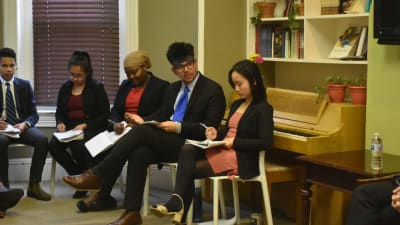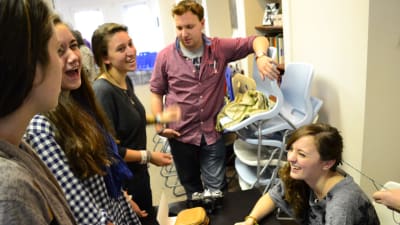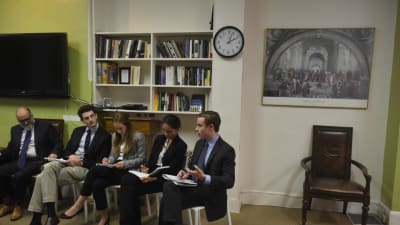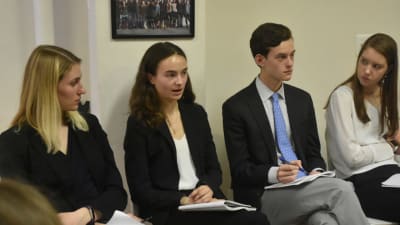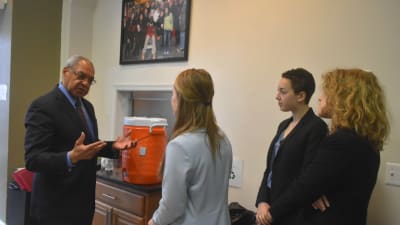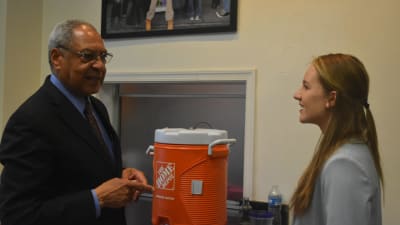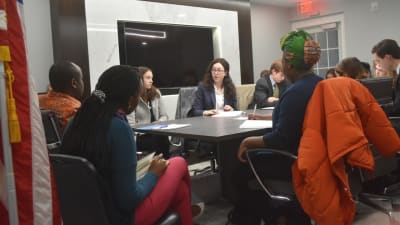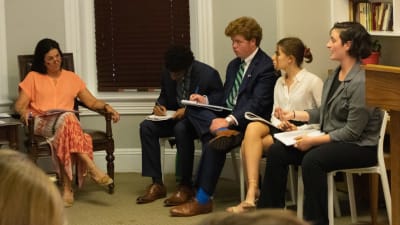Palestinians, Israelis, and Spring 2019
Can Palestinians and Israelis make peace, and if so, how? Is the conflict intractable? Or could new leaders (perhaps some of them SEGL graduates) with new ideas find a solution? These questions, and many others, made up our third case study of the fall. Along the way, we met with two key leaders (another will meet with us later this spring) whose work continues to impact the conflict.
Our students began with SEGL’s account of Israeli-Palestinian history: the competing promises of T.E. Lawrence and the Balfour Declaration, the competing boundaries in 1948, 1967, and today, the competing visions for the future within Israel and within the Palestinian leadership. Our historical account makes every attempt to be unbiased, but we also tell the students that many observers on both sides would want to add, subtract, or edit each PowerPoint slide we shared. Critical thinking and questioning are a must in this area of study!
(Another SEGL truism: if, after a case study, you want to hear a view different from the ones presented, say something! If there is enough interest, we can often arrange for a supplementary speaker later in the semester; if there is not enough interest, any interested student can set up her or his own meetings during a free period.)
On Monday afternoon we met with Ghaith al-Omari, a former top advisor to Palestinian leader Mahmoud Abbas and a negotiator (across the table from Aaron David Miller) in the 2000 Camp David peace talks (he is also the 2015 winner of the SEGL Golden Mug Award). Al-Omari, who now works with the American Task Force on Palestine and the Washington Institute for Near East Policy, shared stories and strategies from his time as a negotiator. For example, it is not enough to negotiate so that your side “wins.” You must also ensure that the speech your “opponent” gives to her people allows her to claim victory as well–otherwise, the deal will fall through. (To read a recent Wall Street Journal op-ed that al-Omari co-wrote, click here; to read an interview with him, click here.)
On Wednesday, we welcomed Elad Strohmeyer, spokesperson for the Israeli Embassy in DC. Strohmeyer presented an Israeli-centric view of not only the conflict, but the government’s view of the Trump Administration, the recent choice to move the U.S. embassy to Jerusalem, and other current hot topics. He also shared his passion for LGBTQ rights in Israel. (Strohmeyer is quoted in recent articles here and here.)
As you might expect, the two viewpoints were quite different, though students also expressed surprise at several key shared beliefs. Learning how to hear the other side, how to ask tough-but-respectful questions, and how to discuss the most deeply-felt of issues are key leadership traits, and also essential parts of an SEGL education.
Later this semester, we hope to hear a third view: that of longtime guest speaker (and advisor to six Secretaries of State) Aaron David Miller. Miller will help provide context for the current status of the conflict and answer questions about his time as a lead negotiator for the U.S. (for example, at the 2000 Camp David II discussions).
Below we have also included photos from our session with George Moose, former Assistant Secretary of State for African Affairs and current Vice Chair of the United States Institute of Peace. , as well as photos from our conversation at the Rwandan Embassy with diplomats whose lives have been affected by the genocide. Those conversations marked the conclusion of our Rwanda case.
Next up: the 2008 financial crisis!






